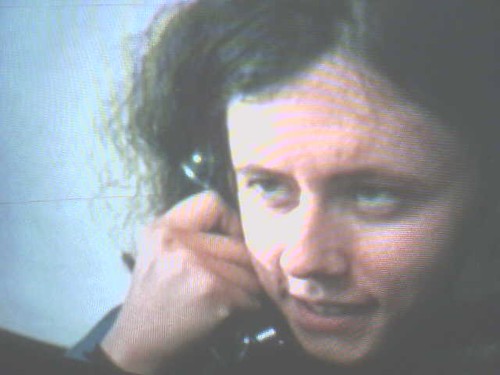“Wizard’s Sleeve” – Yo La Tengo (download here)
from Shortbus OST (2006)
released by Team Love (buy)
(file expires November 28th)
The second post-Beat Your Ass b-side is from the soundtrack to John Cameron Mitchell’s Shortbus, and is really quite groovy: two minutes of sweetly wordless space age exotica that sound like they could’ve been crate-dug on some Numero release, possibly French. There are faint strings, but mostly just atmosphere and a nearby ocean (and likely a view from a stucco balcony).
Haven’t seen the movie yet, so maybe there’s some context there, but the title seems a conceptual sequel to the ironic anti-shock of Beat Your Ass and its contents. Or perhaps they’re just incidentally meme surfing: I think Borat uses the phrase to describe his wife.
“Alice’s Restaurant” – Arlo Guthrie (download here)
from Alice’s Restaurant (1967)
released by Warner Reprise Records (buy)
(file expires November 27th)

On one hand, the film adaptation of Arlo Guthrie’s “Alice’s Restaurant,” directed by Arthur Penn, can be written off as a period piece. Starring a ridiculously young-looking 22-year old Arlo, there are confrontations between rednecks and longhairs, a dude playing Woody Guthrie in his deepest sickness, and a gaggle of super-stereotyped hippies.
On the other hand, though, it also shows remarkable foresight. Released in 1969, the same week as Woodstock, it is also brutal. There are overdoses, spotty runaway groupies, and domestic abusers. There is, in short, a complete collapse of the ’60s idealism that wouldn’t crumble on itself — at least in the fashionable terms of mainstream perception — for quite some time.
The story of the Alice’s Restaurant Thanksgiving Day Masacree — presumably what earned Guthrie the right to make a movie of it — takes up only a small chunk near the end. It’s great, for sure — it’s even got the real officer Obie as himself! — but it’s also quite striking how the song and the film hit totally different tones.
Anyway, it’s Thanksgiving week, and I figured people’d be searching for Alice. Here, once again, is the shitty-ass mp3 I downloaded in college. Enjoy.
The fifth in an ongoing collection of functional webpages and dork tools (excluding any/all Google programs).
o Lulu.com — Print books, hardcover or softcover, color or otherwise, with no minimum order. Quick turnaround, too. (Thx, MVB.)
o Zaba.com — People search. Remember when there was just, like, a phonebook? (Kaw!)
o DownThemAll — Download all the links on a page with this Firefox extension.
o ZipCar — The other night, I watched a friend arrange a ZipCar so he could pick up his cousin at the airport. Bloody amazing.
o Hype Machine — Besides aggregating the latest leaks, the search function is also an easy way to keep up with b-sides, radio sessions, and the like. If only it didn’t buffer so often.
(Short fiction, shorter increments.)
Looper in the Dark: no. 1, no. 2, no. 3, no. 4, no. 5, no. 6, no. 7, no. 8, no. 9, no. 10, no. 11, no. 12
The broken machine’s canister was deployed, Looper noticed. He followed the source of the sound. Kneeling, he saw a canvas belt that had stopped. A loose spring had sprung, and caught in its motion. A heavy rubber stopped caused the spring to vibrate against the cogs with a precise, metallic rattle. Looper glanced at an adjacent machine. There, the canvas belt moved slowly.
Looper pushed the rubber stopper back into place, freeing the gears. The belt began to turn again. Within seconds, the whole room evened into silent harmony. Stepping back, Looper noticed a pattern on the floor that reminded him of the tile fountain in the plaza near the factory. He left the flashlight in the secretary’s window and walked home. The snow fell through the buildings’ massive spotlights, which shot upwards and illuminated the top floors.
At home, he sat still. Soon, he found himself drifting in the perfect quiet he had long known. There, the apartment was all at once. It could bend in the dark, yes, but only in ways Looper knew: his wife drinking tea in the corner, the warmth he knew would await him when he returned from his cousins’. It could be any of these, at any time, and Looper listened. Around the city, the offness had lifted, Looper knew. It was gone. [END]
(Short fiction, shorter increments.)
Looper in the Dark: no. 1, no. 2, no. 3, no. 4, no. 5, no. 6, no. 7, no. 8, no. 9, no. 10, no. 11, no. 12
Looper lost count of the floors. They bore no correlation to the windows. He reached the top of the stairs. There, he found a space that opened across the span of the entire building. The streetlamp outside cast a familiar, buttery glow on the rows of machines. Looper turned off the flashlight.
Strolling cautiously down the aisle, he felt their humming. Their arrangement was methodical, if irregular. Looper felt as if he were in a garden. Each machine, he saw, had a glass tube emerging from it. The tubes shot straight out, before turning 90 degrees, and disappearing into the floor. Each tube had a copper canister at its bottom.
Near the room’s center, there was a plain metal desk. Next to the desk, there was a large open area. And, next to the open area, there was a machine that did not hum as the others did. Looper approached it. The machine cried quietly, wounded. Looper could hear a whirr coming from its back.
(Short fiction, shorter increments.)
Looper in the Dark: no. 1, no. 2, no. 3, no. 4, no. 5, no. 6, no. 7, no. 8, no. 9, no. 10, no. 11, no. 12
The factory was again unlocked. The lights were off, but the entry was no less inviting. Looper could not see the olive green walls in the dark, but he could feel them. A large black flashlight sat in the secretary’s window, like fresh linens for a houseguest.
The upper floors were like catacombs, Looper found. They did not conform to the blueprints Mr. Brown had shown him. On the fourth, Looper branched off from the main hallway. He passed through a series of telescoping rooms, one after another. The beam was strong. In some, there were cabinets. In others, there were shelves. Jars of screws and electrical parts filled them.
On another floor, Looper saw the machines Mr. Brown had described. They were under canvas, mostly. He imagined stuffed animals, dead fur matted, concealed beneath them. He let the light linger on one machine, tracing its shape. He could not get a sense of its whole. Looper sniffed at the air for dust.
(Short fiction, shorter increments.)
Looper in the Dark: no. 1, no. 2, no. 3, no. 4, no. 5, no. 6, no. 7, no. 8, no. 9, no. 10, no. 11, no. 12
Christmas fell on a Tuesday that year, so the city closed its offices the Friday previous. As usual, Looper would go to his cousins’ home east of the city for dinner. He did not see them often. This year, he looked forward to the three-hour train ride more than he had since his wife died.
The final straw came on Saturday night, however. Looper had called the cousins to remind him he was coming. He opened the window to admit cold air into the room to mingle with the radiator’s pleasant humidity. Instead, the offness filled his apartment, and he felt as if at the bottom of the ocean.
Looper had the sense to bundle up before he walked onto the street. He did not rush. It was late. The city was silent. He needed to surface. Looper again walked west on 79th Avenue. Soon, he would reach the plaza. And, on the other side of the plaza, he would emerge into the normal. It was only when he got there that he remembered how close he was to the factory.
(Short fiction, shorter increments.)
Looper in the Dark: no. 1, no. 2, no. 3, no. 4, no. 5, no. 6, no. 7, no. 8, no. 9, no. 10, no. 11, no. 12
It got worse. Looper remembered reading a story in the newspaper about how sunspots caused interference on people’s telephones and televisions. He wondered if the sun had caused this, too. He sat for hours in the warm living room. The furniture moved silently, like tectonic plates, and shifted back. Looper wondered if he was running a fever.
As the holidays approached, Looper thought again about the factory he had visited some weeks earlier. It was the milk that did it. The milk that now always tasted wrong. He had smelled it, at the factory, he knew. It was in the air, trace elements were.
It was not hard to get the secretary to print out the file for the building. Bowman Manufacturing, it was. The documents were unclear about the factory’s purpose. In fact, the file contained little more than Looper’s notes. He tucked the folder in his briefcase. It was the last day before the vacation, and he was glad. Even in the offness, it was still his room.
(Short fiction, shorter increments.)
Looper in the Dark: no. 1, no. 2, no. 3, no. 4, no. 5, no. 6, no. 7, no. 8, no. 9, no. 10, no. 11, no. 12
It was in the next week that other people began to recognize the offness, too. Walking to work in the snow, Looper saw a boy, perhaps about 9. The boy was blonde, and he studied the row of Christmas trees on the sidewalk as the snow fell around him. Looper could see why instantly.
The trees were not in a straight line, absolutely, but the wind blew through them wrong, as well. In some places, the branches sagged, as if in a breeze. In others, they threatened to snap. Looper could not tell if it was the fault of the wind or the trees. He and the boy acknowledged each other, and Looper continued on to work.
The man at the newsstand complained of too much ink on his fingers. At the bank, Looper overheard tellers speaking in hushed voices about the ledgers being several dozen cents incorrect. In the dark, Looper drank his off-flavored milk and wondered when society began to expect it to taste the same every time.
(Short fiction, shorter increments.)
Looper in the Dark: no. 1, no. 2, no. 3, no. 4, no. 5, no. 6, no. 7, no. 8, no. 9, no. 10, no. 11, no. 12
Mr. Brown led Looper off the floor. They entered another hallway. Looper felt a change in the air. He smelled something, too. He could practically taste it on his tongue. The sound of the machines quieted as they walked deeper into the building. The odor increased, though. Looper could feel a layer of saliva on his tongue.
“The vents from upstairs,” Mr. Brown noted. “Some people seem to like it. I do not mind it myself.”
“What is it?” Looper asked. He had tasted it before, somewhere. Perhaps inside a chocolate, once.
“Byproducts, mostly,” Mr. Brown replied, fixing his tie. “Byproducts,” he said again. Looper inspected the remainder of the building.
Twice, he got lost in passages of endless doors. Both times, he was unhappy to recover his bearings.


